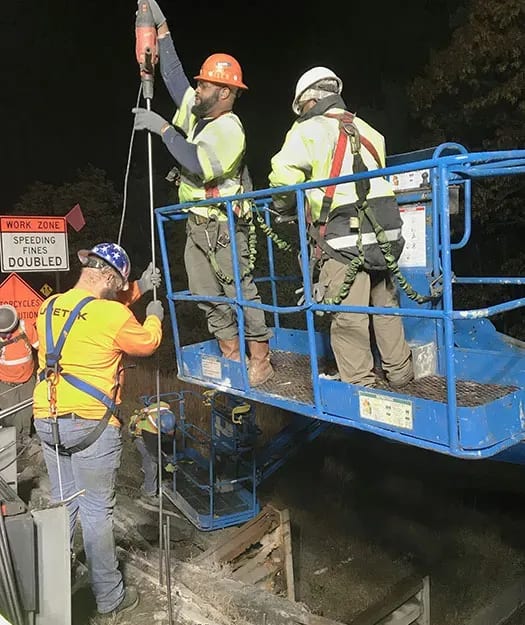I-90 Exit Ramp Stabilized Near Weston, Massachusetts
Problem
Just south of Weston, Massachusetts, Mass DOT officials were dealing with a failing bin-wall unit supporting the slope at the I-90 East and I-95 South interchange. There had been significant damage to bin-wall unit #2, and the slope was exhibiting signs of active failure. Heavy granite pavers supporting the slope had slid down and broken the bin-wall unit. Subsequently, foundation soils began to move down the slope as well, passing through the broken bin-wall and settling below. The contractor tasked with repairing the bin-wall unit could not proceed with work until the foundation soils under the slope and roadway were stabilized. Massachusetts DOT officials called URETEK.
Analysis
The URETEK crew arrived on scene and began their analysis of the situation. Using a surface / slope grid drawing they created for the site, the crew began Dynamic Cone Penetrometer (DCP) testing to identify voids and areas of base and sub-base soil weakness. Upon completion of the DCP testing, the crew developed a plan for URETEK Deep Injection® (UDI) that would target identified zones and effectively stabilize both the slope and the adjacent roadway.
Solution
The UDI application was completed in accordance to the injection plan created for the site. URETEK crews performed injections under the roadway and into the slope in a tight grid pattern at multiple elevations to stiffen and strengthen the foundation soils. With the slope and roadway properly stabilized, the bin-wall contractor was able to begin its work to repair the failed bin-wall unit.
Result
Upon completion of the project, the foundation soils under the I-90 exit ramp roadway and adjacent slope were stabilized. Large open void areas beneath the surface were filled with URETEK 486 Star® polymer. Much of the work was completed at night, minimizing the impact on traffic at the site. Massachusetts DOT officials declared the project a success, and were happy to be able to safely resume their original project and repair the failed bin-wall unit without fear of a slope cave-in.
URETEK Deep Injection® (UDI)
Widely referenced throughout our industry, UDI involves the injection of structural polymer into base and subgrade soils to increase the load bearing capacity. This is achieved by injecting the polymer through small holes drilled directly through the pavement structure to depths determined by site-specific analysis. Our URETEK 486 Star® material flows easily into voids and weak zones within the soil mass below. Through a controlled chemical reaction, the expanding polymer compacts surrounding soils and applies a controlled pressure on targeted areas of the affected pavement above. If needed, a multi-injection design plan is utilized to gently return the pavement to its original grade. The composite material quickly cures into a strong, dimensionally stable, and water-resistant geo-material, providing years of reliable service.
URETEK 486 Star®
URETEK 486 Star® polymer is a two-component, high-density, expanding thermoset polyurethane system. It was developed to be the ideal solution for under-sealing, void filling, lifting of settled pavement, stabilization and stiffening of weak soils, and for encapsulating and sealing buried infrastructure. URETEK 486 Star® is environmentally inert, non-toxic, and resists underground water erosion or weakening due to its industry-leading hydrophobic properties.


